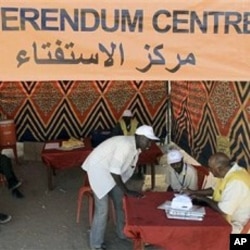A week-long referendum gets underway this Sunday in southern Sudan. Over four million voters will determine whether their region breaks away or remains part of Sudan. The referendum was part of the Comprehensive Peace Agreement, signed in January 2005 between the Sudan People's Liberation Movement (SPLM) and the government of Sudan.
Preparations
Lt. Colonel Africano Mande of the Sudan People’s Liberation Army (SPLA) says all things considered, preparations for the referendum have been adequate.
“Looking at the timing and given the fact that quite a number of milestones set by the CPA have been delayed, all institutions tasked with… organizing this referendum I think have done their best, and I am optimistic,” he says.
Mande concedes people may have difficulty moving from place to place during the voting.
Survival
Can an independent south Sudan survive as a viable state – should voters decide to secede?
“I think it’s worth giving southern Sudan a chance,” says Mande. “Southern Sudan has been struggling to set up the basic ingredients of governance. So given a chance, southern Sudan will be able to emerge as a viable state.”
The military officer cautions that southern Sudan cannot achieve this on its own. He says it will require all kinds of support to lift an independent southern Sudan to the standard “expected of a functional and viable state.”
Lessons
Mande says southern Sudan has a lot to learn from countries that have experienced break-ups. He refers to the Ethiopian example.
“Definitely there are lessons to learn from the experience of Ethiopia,” he says. “Southern Sudan and the northern Sudanese will have to understand that walls are never going to be built between the two countries. The two countries need each other, therefore, must avoid conflict – at all costs.”
Bashir visit
The SPLA officer welcomes President Omar al-Bashir’s recent visit to southern Sudan. He describes the visit as a “good gesture,” but adds, “Mr. Bashir doesn’t have a choice. He is responding to a reality that is dawning on everybody else in Sudan.”




